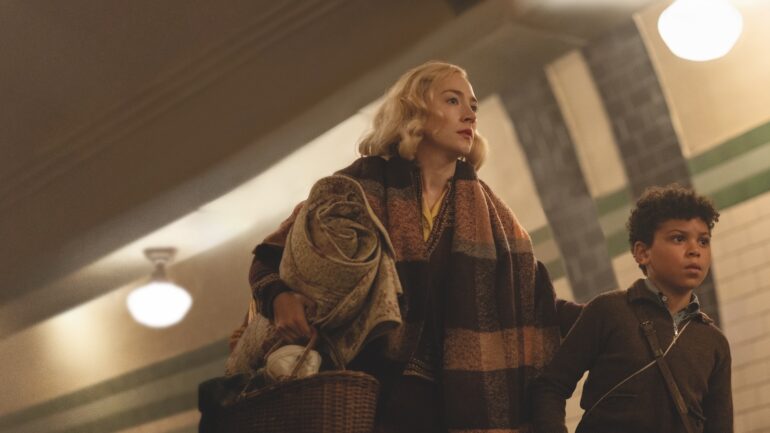If you go to Stepney and Whitechapel in east London, amongst the 19th-century terraced houses that still stand, you will find plenty of apartment blocks, both social housing and privately owned. Such developments became commonplace in the 1950s and 1960s as the city gradually recovered from the Nazi bombing raids and rebuilt, covering over the ruined terraces that dotted the city like scars. Blitz, Steve McQueen’s drama set in the fires of the Nazi’s krieg against the city’s civilians, has the feel of one of those apartment blocks. It’s sturdily built, and does the job for which it was intended, but this new edifice lacks the character of the humble homes that stood there before.
The stories of the Blitz are well-known and documented, and McQueen’s vision is well-intentioned, steering attention away from Churchill and the royals for a change to investigate the sufferings of the civilian population. The problem is, London is a big city, and McQueen feels encouraged to cast his net too wide, even when the film is driven by just one story. Rita (Saoirse Ronan) sees fit to send her young son George (newcomer Elliott Heffernan) off with the thousands of other children that were sent to the English countryside to evade the air raid, but their bond is enough to drive the lad off the train and send him on a journey back home to family, and back into the range of German bombs. A parent and son risking all kinds of dangers and travelling a long way to reunite? It’s Finding Nemo with less water, more bombs, and an inability to identify its target audience. Any hopes of a timeless character study in the vein of Terrence Davies are swept away in its polish.
George’s attachment to his mother is understandable in the context of his experience as a mixed-race child in a world that isn’t yet ready to see him as worthy of respect. Rita and her father (A compellingly stoic feature debut from the Jam’s Paul Weller) love the boy, but he’s constantly being made aware of his non-whiteness by other people. Blitz is so many stories rolled into one: a war picture, a racial commentary, a kitchen sink drama, a children’s adventure, a disaster movie. As shoved together in McQueen’s script, these elements jostle for air and attention. He attempts to make parallel narratives work by cutting between George and Rita’s experiences, but a throughline is missing to hold them together. For a good stretch of Blitz, Rita isn’t even aware George has absconded, and when she does find out, she’s hemmed in by the bombs and a need to believe that a young child will somehow make his way back to a war-torn city. These narrative choices suggest that McQueen is aiming for wide recognition by ticking a lot of award-favoured boxes, even though he achieved that already with 12 Years A Slave, a much more vicious and assured film.
The headstrong George does indeed make his way along the railroad in an episodic journey filled with all the ne’er-do-wells and caring souls that a Dickensian urchin could dream of. A train ride with some fellow evacuees is a cutesy sub-Edith Nesbit sojourn, until a violent interlude sends George off on a new journey in a different genre. McQueen’s generic indecisiveness starts to grate as the film rattles on and George gets back to the London suburbs. The characters he encounters become more one-note. A kindly air raid warden (Acclaimed singer-songwriter Benjamin Clémentine) would sprout wings if they could fit under his raincoat and helmet. He’s also not averse to delivering a rousing speech to diffuse a racially-charged exchange to hammer home McQueen’s point. By the time Kathy Burke and Stephen Graham roll in to ham it up as Cockney versions of the kiddie-exploiting Thénardiers from Les Misérables, Blitz has eschewed any knowing insight for easy sentiment and arguments (however valid) delivered with the subtlety of a bouncing bomb.
Tin-eared as the script can be, Ronan and Heffernan sell the core relationship. With a spot-on Cockney accent and a soothing singing voice, Ronan brings all the fears and frustrations of a lost young mother to blazing life. A backstory explaining the absence of George’s father (C.J. Beckford) sees Ronan at her devastating best. At her side, Heffernan is a real find. McQueen uses what would be precociousness in any other child performer to illuminate George’s drive to see his mother again. He needs to be driven, as McQueen has George go through a disaster epic’s worth of setpieces to get home. Whether in bombed-out living rooms, flooding Tube tunnels, or just in the quietness of rare moments of domesticity, Yorick Le Saux’s camera and the production paint a lived-in 1940s London, at once crumbling and cosy. Even Hans Zimmer sees fit to let the bombs drown him out with a score of rare restraint. It’s just a pity the screenplay wasn’t similarly refined. Still, the excitement of its setpieces and the committed leads just about keep Blitz afloat, even if McQueen’s ambitions detonate less with bang, than with a whimper.
Blitz opened the London Film Festival on 9th October. It plays in select cinemas from 1st November, and streams on Apple TV+ from 22nd November

